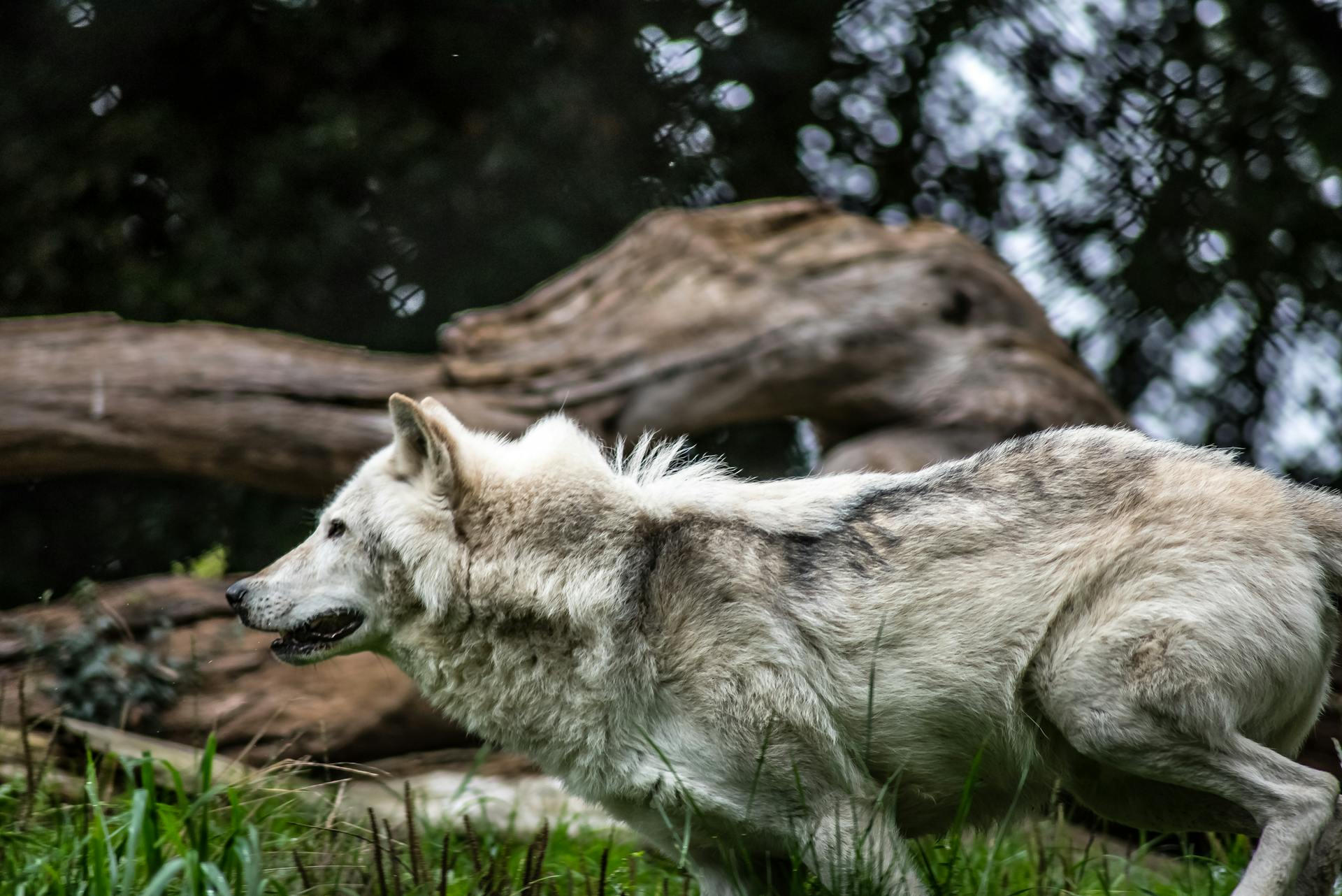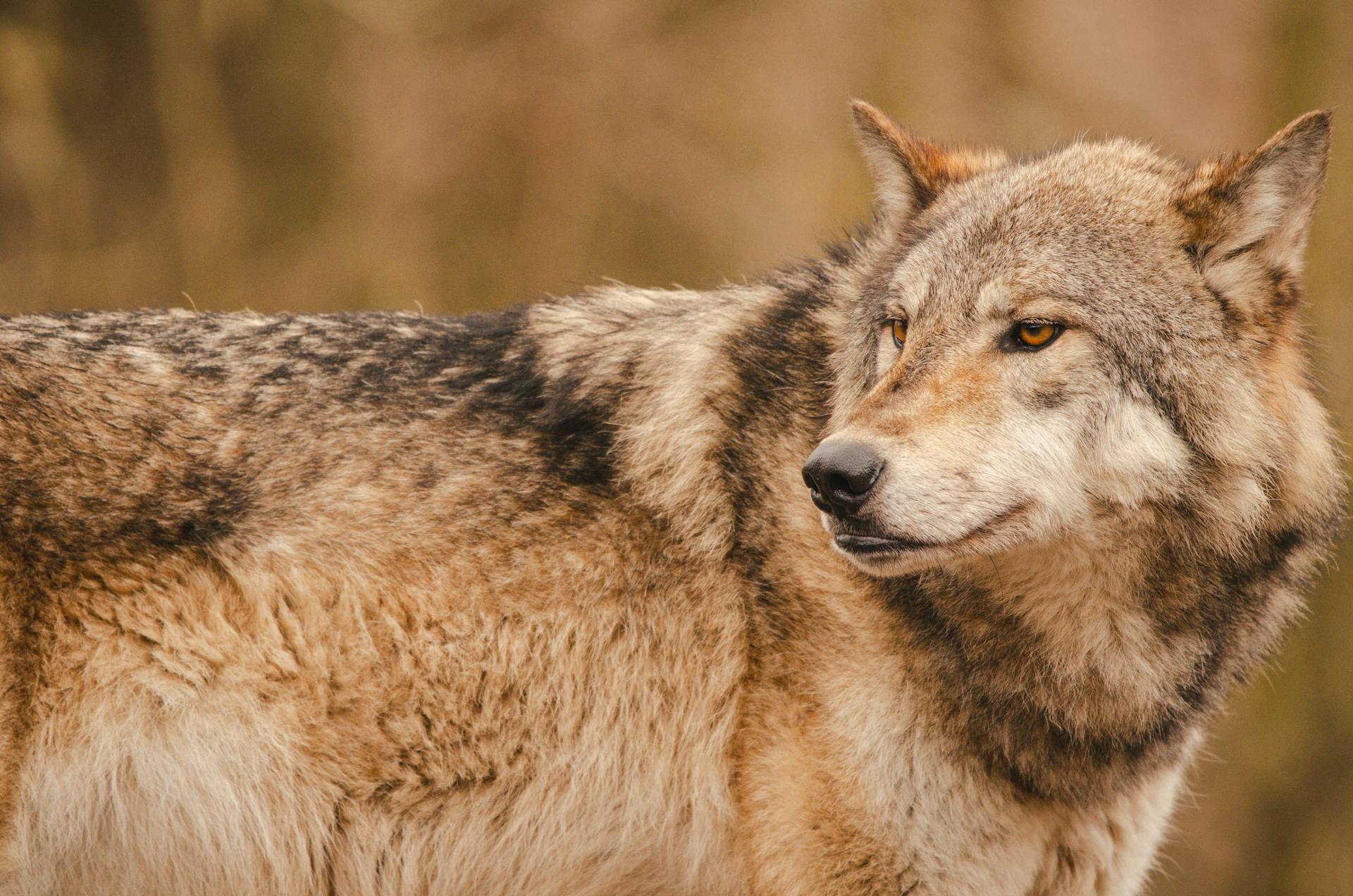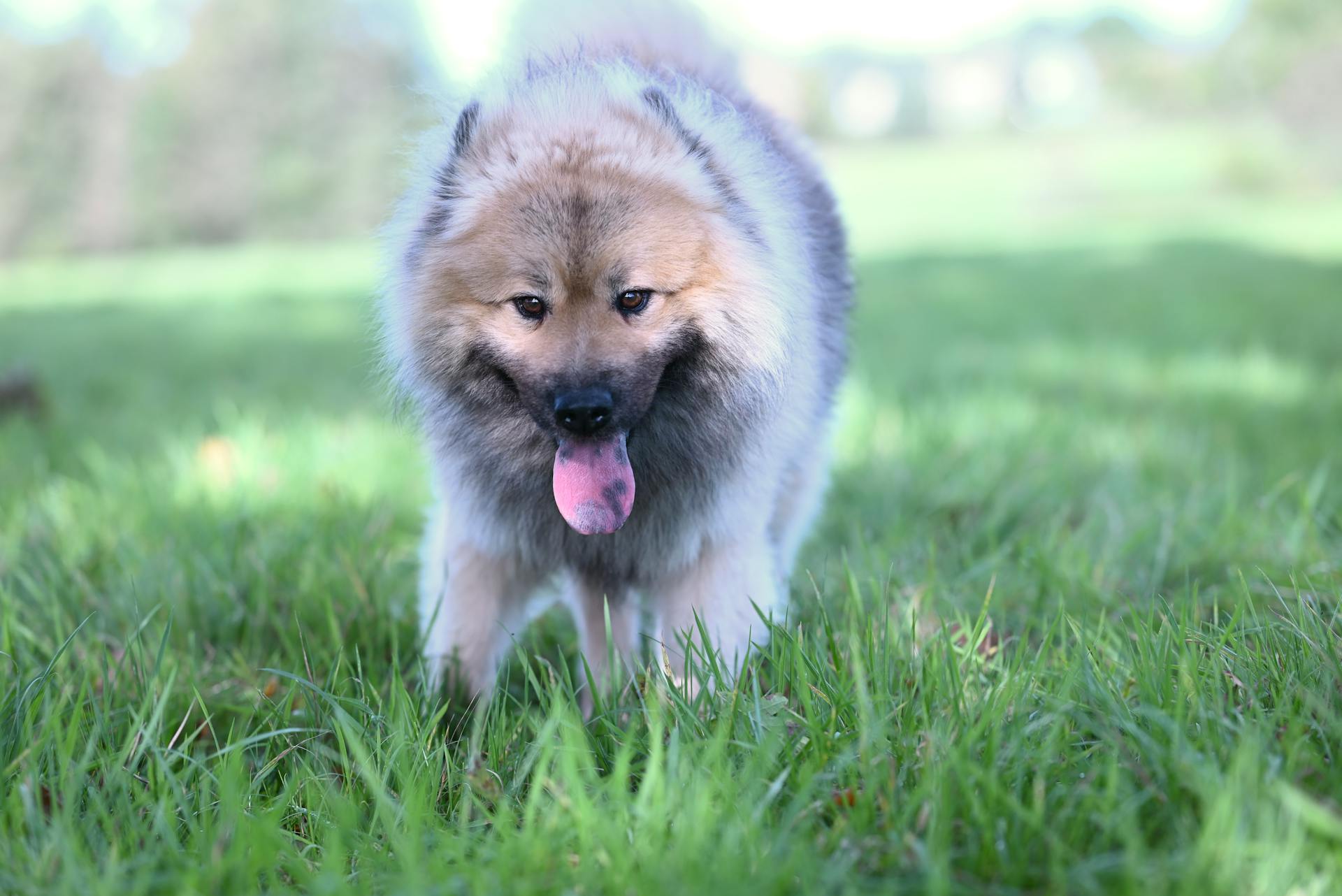
Wolf dogs can be a great choice for the right owner, but they do require a lot of exercise.
They need at least 2 hours of physical activity and mental stimulation every day, or they can get destructive and restless.
Exercise is just one aspect of their care, as wolf dogs also need regular training and socialization from an early age.
This can be a challenge for inexperienced owners, but with patience and consistency, they can learn to behave well in public and around other animals.
Wolf dogs are also naturally wary of strangers and may not make good pets for families with young children.
Are Wolf Dogs Good Pets?
They're considered the most misunderstood animals in America, with advocates arguing they can be wonderful pets and opponents saying they're unpredictable and inherently dangerous.
A wolfdog's rabies vaccination status is a major concern - there's no approved rabies vaccination for them, and the USDA doesn't extend approval for the standard rabies vaccine to "hybrids".
This means that if a wolfdog bites someone, it can be considered a rabies risk, even if they've been vaccinated.
Pets
Wolfdogs as pets are a complex issue. They're treated as domestic pets by the federal government, but as wild animals when it comes to rabies.
Their rabies vaccination status is unclear. There's no approved rabies vaccination for wolfdogs, which means owners can't rely on standard vaccinations to protect against the disease.
In some places, wolfdogs are permitted as pets, while in others they're forbidden. They're even showing up on breed ban lists, alongside Pitbulls and other so-called "dangerous breeds."
A wolfdog's bite can be considered a rabies risk, even if they've been vaccinated. This is because the only reliable test for rabies requires an examination of the animal's brain, which can't be done without euthanizing the animal.
Euthanasia is often necessary if a wolfdog bites someone. This is a high-stakes gamble for owners, and one that could prove fatal for the wolfdog.
Dogs
Wolf dogs are a unique breed that originates from the breeding of a domesticated dog with a wolf species. Most wolf dogs come from the crossing of a domesticated pooch and a Gray wolf.
Many states have banned the ownership of wolf dogs, while some allow ownership with a proper wildlife permit. This makes it a complex and state-dependent decision.
Wolf dogs are extremely difficult to keep up with and come with great responsibility, more than usual dog-ownership. This is often a surprise to owners who initially think they can handle the challenges.
Due to these reasons, more and more wolf dogs are showing up to sanctuaries and shelters or even being abandoned by their owners.
What is a Wolf Dog?
There's no clear definition of what a wolfdog is. Most experts use the term to describe an animal with a pure wolf in its family, no more than four or five generations back.
Genetic testing is theoretically possible but not 100% accurate and is mainly reserved for wildlife management and law-enforcement agencies.
Phenotyping, having an expert evaluate an animal's physical and behavioral characteristics, remains the most accessible way to identify a wolfdog.
Few experts are trained in phenotyping wolfdogs, leading to many dogs being erroneously labeled.
Legality and Restrictions
Wolfdog ownership is heavily regulated in many states, and local laws often supersede state laws. In fact, 28 states regulate wolfdog ownership at the county level.
Even in states where wolfdogs are legal, many require a permit or registration, which can be a challenge for owners. In some states, wolfdogs are considered "dangerous animals" and require special permits, just like owning a lion.
Some states have specific regulations based on wolf-content levels, such as California, where only first-generation wolfdogs are illegal.
Cons of Ownership
Owning a wolf dog can be a huge responsibility, and it's essential to consider the cons before making a decision. Wolf dogs require a lot of work to care for, and their needs are far from typical domesticated dog needs.
They need to be surrounded by 8-foot high fences with base guards to prevent escape, as they can easily maneuver around simple shelters or restraints. This means you'll need a secure and escape-proof enclosure to keep them safe and others safe too.

Wolf dogs are wary or untrusting of people they don't know or aren't used to, which makes taking time away from the hybrid, like on vacation, very difficult or even impossible. This can be a challenge for families or individuals with busy schedules.
They can roam up to 30 miles a day, covering their territory and protecting their resources, which means you'll need a lot of acres to cater to this behavior. This can be a significant challenge for those living in urban or suburban areas.
Many veterinarians won't medically serve wolf dogs, making it difficult to find vet care when needed. This is due to issues with liability, which can be a concern for owners.
Dog Restrictions
Dog restrictions can be a real challenge, even in states where wolfdog ownership is allowed. In many states, wolfdogs are regulated at the county level, so local laws will determine if they're legal.
Some states require a permit or mandate registration for wolfdogs, which can be a hassle to obtain. This includes states like Arizona, Arkansas, Colorado, and Indiana.
Many states require vaccinations, veterinary certificates, and confinement in specific kinds of cages for wolfdogs. This is to ensure public safety and the well-being of the animals.
In some states, wolfdogs are considered "dangerous animals" and require a special permit, just like owning a lion. This is the case in states like California, where only first-generation wolfdogs are illegal.
It's essential to research and understand the specific regulations in your area before considering wolfdog ownership.
Is It Legal to Own a Pet?
Owning a pet can be a dream come true, but it's essential to check the laws in your area first. Some states, like Hawaii, Illinois, and Wyoming, outright prohibit the ownership of wolf dogs.
You'll need to do some research to find out what's allowed in your state. For example, North Dakota, Kentucky, and Florida require permits and specific standards for enclosures.
If you're considering owning a wolf dog, it's crucial to contact your county officials to find out what the current laws are. Colorado, Oregon, and Tennessee classify wolf dogs as domestic animals and have no laws against ownership.
It's always a good idea to check with local authorities before bringing a new pet into your home.
Suggestion: Kangal Dog Pet
Types of Wolf Dogs
Saarloos Wolfdogs are a specific type of wolf dog, bred from a German Shepherd and a wolf. They're known for being intelligent and responsive to training, but they do require firm boundaries.
These dogs are often misunderstood as being aggressive, but in reality, they're generally not. However, they do require a lot of care and attention, which can be a challenge for some owners.
One thing to note is that wolf dogs can be quite varied in their breeds, with some coming from the crossing of a domesticated dog and an Ethiopian, Red, Eastern Timber, or Gray wolf. However, most wolf dogs come from the Gray wolf.
Saarloos Dog
The Saarloos Dog is a cross between a German Shepherd and a wolf. They are intelligent dogs that respond well to training.
These dogs require someone who can give them firm boundaries. They generally aren't aggressive, despite their tough appearance.
Tamaskan
The Tamaskan is a unique breed that's often described as wolf-like due to its thick coat and straight, bushy tail.
This breed is known for being good family dogs, but they do require a lot of attention and interaction, so it's essential to spend plenty of time with them.
They're not suited for households where owners are away for extended periods, as they can get anxious and stressed if left alone for too long.
Czechoslovakian Dog
Czechoslovakian dogs are quite the adventurous bunch. They need lots of room to run and explore.
These large, intelligent wolf dogs are naturally inclined to be dominant and independent.
Pomsky
Pomskies tend to be highly intelligent, loving, and playful. They're a great match for active owners who can keep up with their energetic nature. Generally, Pomskies weigh less than 30 pounds. Their wolf-like face is one of their most distinctive features.
General Information
Wolf dogs are a unique breed that can make great pets for the right owner. They are a cross between a wolf and a domestic dog, typically a husky or other breed.
Wolf dogs are highly intelligent and can be trained with consistency and patience. They thrive on mental and physical stimulation.
Their large size and high energy levels require regular exercise and a spacious living area.
A fresh viewpoint: Wolf Cross Breed Dog
Potential Behavior Problems

Wolfdogs may display behaviors that are challenging to manage in a home environment. Experts have determined that wolves and dogs share more than 99 percent of their DNA, but those few strands make a big difference.
A wolf's natural instinct to be self-sufficient can lead to problems like hunting small animals in your yard. This is because a wolf must be capable of finding and killing prey to survive.
Wolfdogs may try to fend off enemies, which can manifest as aggression towards people or other animals. This is essentially the opposite of what you want in an animal who's sharing your home.
Wolfdogs may display any or all of these behaviors to one degree or another, including killing small animals in your yard. This can be a problem if you have pets or livestock.
Owning a Dog
Owning a dog is a big responsibility, especially if you're considering a wolf dog.
Many states have banned the ownership of wolf dogs, so be sure to check your local laws before bringing one home.
It's not just about the laws, though - wolf dogs are extremely difficult to keep up with and require a lot of work.
Most wolf dogs come from the crossing of a domesticated dog and a Gray wolf, making them a unique but challenging pet.
If you're not prepared for the challenges of owning a wolf dog, you may find yourself struggling to care for it.
Many owners are initially drawn to wolf dogs for their "exotic" nature or status, but they often prove to be unfit for the task.
Wolf dogs are often abandoned by their owners or end up in sanctuaries and shelters because of this.
Frequently Asked Questions
How aggressive are wolf dogs?
Wolf dogs can be unpredictable and may pose a threat to humans and other animals, making them a potentially hazardous pet. However, individual temperaments vary, and some wolf dogs can be docile and non-aggressive with proper training and care.
Can you trust a wolf as a pet?
Wolves in captivity may not always view humans as friends, and can behave aggressively like they would with other wolves. Trusting a wolf as a pet requires careful consideration and understanding of their natural instincts
Are wolf dogs loyal to humans?
Wolf dogs are often described as loyal and loving animals, but opinions on their temperament vary widely. Their loyalty to humans can be a strong point for some owners, but it's essential to consider the complexities of their nature.
Sources
- https://www.thewildest.com/dog-lifestyle/do-wolfdogs-make-good-pets
- https://texaswolfdogproject.org/resources/owning-a-wolfdog
- https://www.womansday.com/life/pet-care/g29380555/wolf-dog-breeds/
- https://www.dogster.com/lifestyle/what-is-a-wolf-dog
- https://sitmeanssit.com/dog-training-mu/austin-dog-training/wolf-dogs-good-pets-or-wild-animals/
Featured Images: pexels.com


